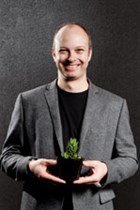
Top stories






LifestyleWhen to stop Googling and call the vet: Expert advice on pet allergies from dotsure.co.za
dotsure.co.za 2 days
More news
















Global industry drivers are widely agreed upon. Deutsche Telecom's presentation about this clearly articulates where opportunities lie in the next three to five years.
There were some interesting thoughts bringing the new 'few billion' people onto the internet. There is no doubt what the impact of internet connectivity does to change the lives of people, and it's clear that this access has to be via mobile broadband.
Stephen Elop, CEO of Nokia was optimistic about the pace at which this rollout is going to occur, "Connecting the next billion will occur much more quickly than the first billion, of that we can be certain."
Gary Kovacs who is CEO of Mozilla Corporation was fairly scathing about the dominance of Apple and Google's Android. They have become a victim of their own successes, with not just Mozilla taking aim at them, but many of the mobile operators too.
He said that "the world is counting on us to do a little better than we have done up to now in bringing the internet to them. The first two billion people took 20 years to connect to the internet, the next two billion will take five years and will be coming from emerging markets. It's 'the next generation', and two or three operating systems or companies cannot service this next generation. Maybe we need to completely change the mobile ecosystem. We need to move from 'there's an app for that' to 'there's a web for that'."
When asked about the developer ecosystem, he commented "we don't have to get developers to develop apps for FirefoxOS. There are already ten million HTML5 developers that are enabled."
It's clear that offering services is one of the most important things to the next few billion as they are younger, urban people and not rural people as assumed. By creating services that improve literacy and healthcare, the overall market for connectivity and commerce will lift mobile connections past the nine billion mark. The same holds true for banking as existing financial institutions cannot offer branch networks to all. It must be mobile.
As always, a marketing discussion cannot go far without Unilever being close. As the world's second largest advertiser, it has done some amazing work across the globe using mobile in smart and simple campaigns. Keith Weed, Unilever's CMO stated that "he wants to get to the future first and wants Unilever to be the best mobile marketer in the world." He shared their approach to integrating mobile into their marketing efforts:
I sensed that Unilever's approach to campaigns in emerging markets had more than just a sales drive and were often designed to really change and enhance the lives of its customers. Meaningful marketing that delivers real value. Not bad for an organisation of its scale.
Evan Gerber from Fidelity Investments had some great points about mobile and technology adoption:
The open mobile OS ecosystems
The final keynote of the day was about the alternatives to the Apple iOS and Android duopoly. It was the open source community's big entrance into what is generally considered to be an unhealthy dominance by the two 'A's'.
I was a proud South African to see Mark Shuttleworth delivering exceptionally articulate arguments about the Ubuntu OS Mobile. Considering that his projects could impact the connectivity and therefore lives of so many people is a humbling thought.
The interface looks very interesting with innovative touch and slide navigation. I managed to capture his demo videos of it running on a phone and tablet . Please excuse the quality.
Mitchell Baker, the founder of Mozilla is a very interesting person. She didn't hold back when describing the state of the mobile and internet industries. Her view that central control destroys quality was demonstrated in this comment, "when products are managed by large, dominant customers, they will decline to irrelevance. At one time even Internet Explorer was a good high quality product."
Decentralised, web-based platforms are what she believes are the future for mobile and is the only approach to be able to deliver what the 'rest of the world' requires.
It is going to be tough for the open source movement to gain traction and distribution, however, with the mobile operators fighting the dominance of Apple and Android, and throwing their weight behind FirefoxOS, they might just be able to make a difference.
As always, follow me on Twitter at @angusrobinson and let me have any questions or comments.
